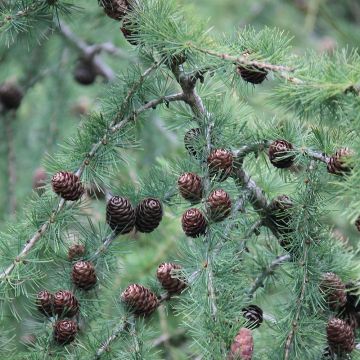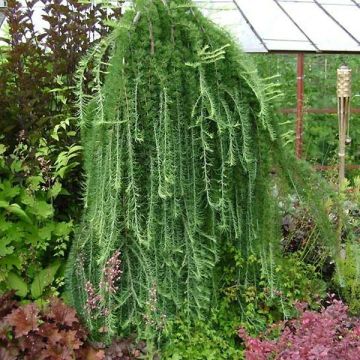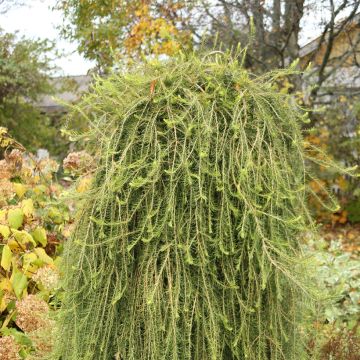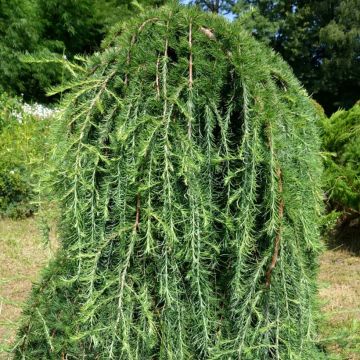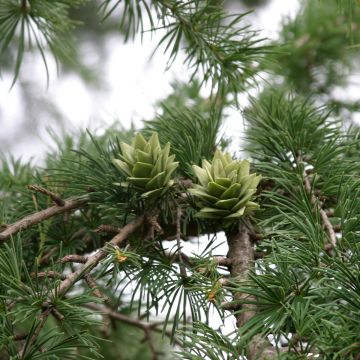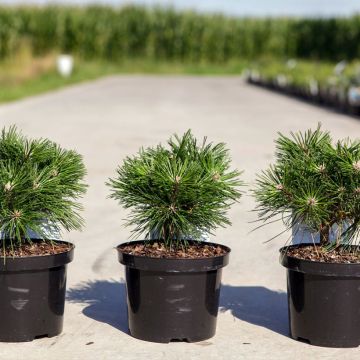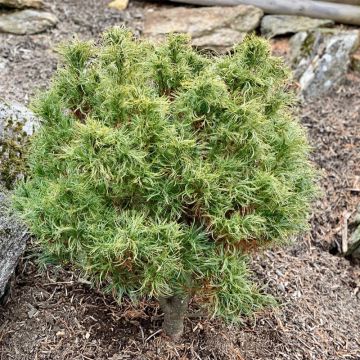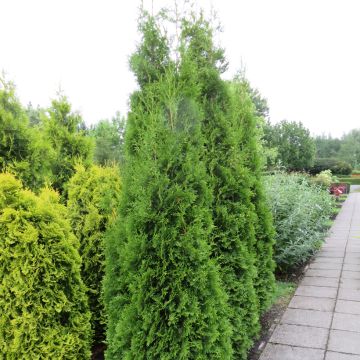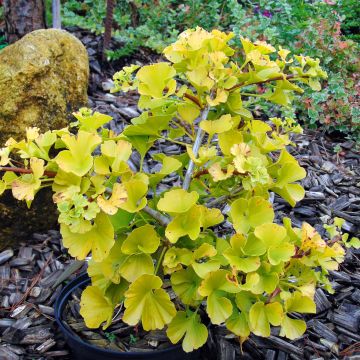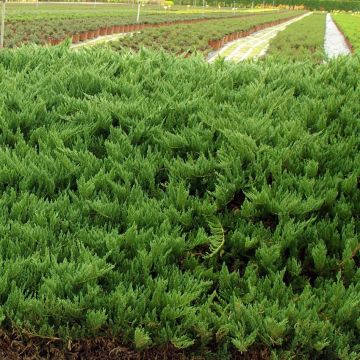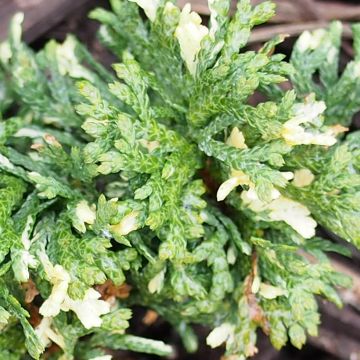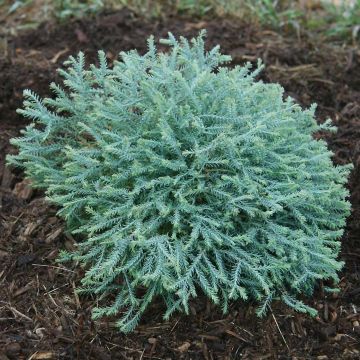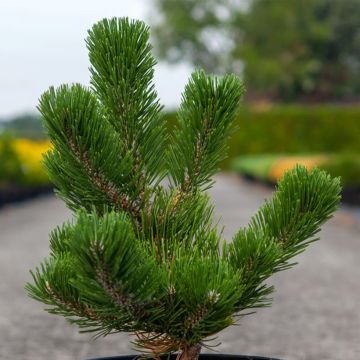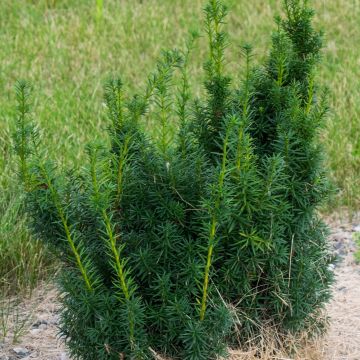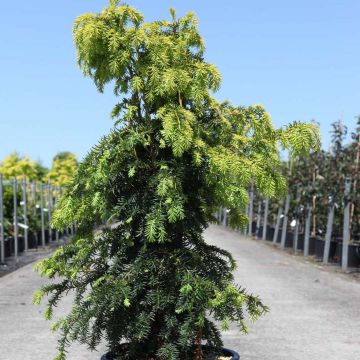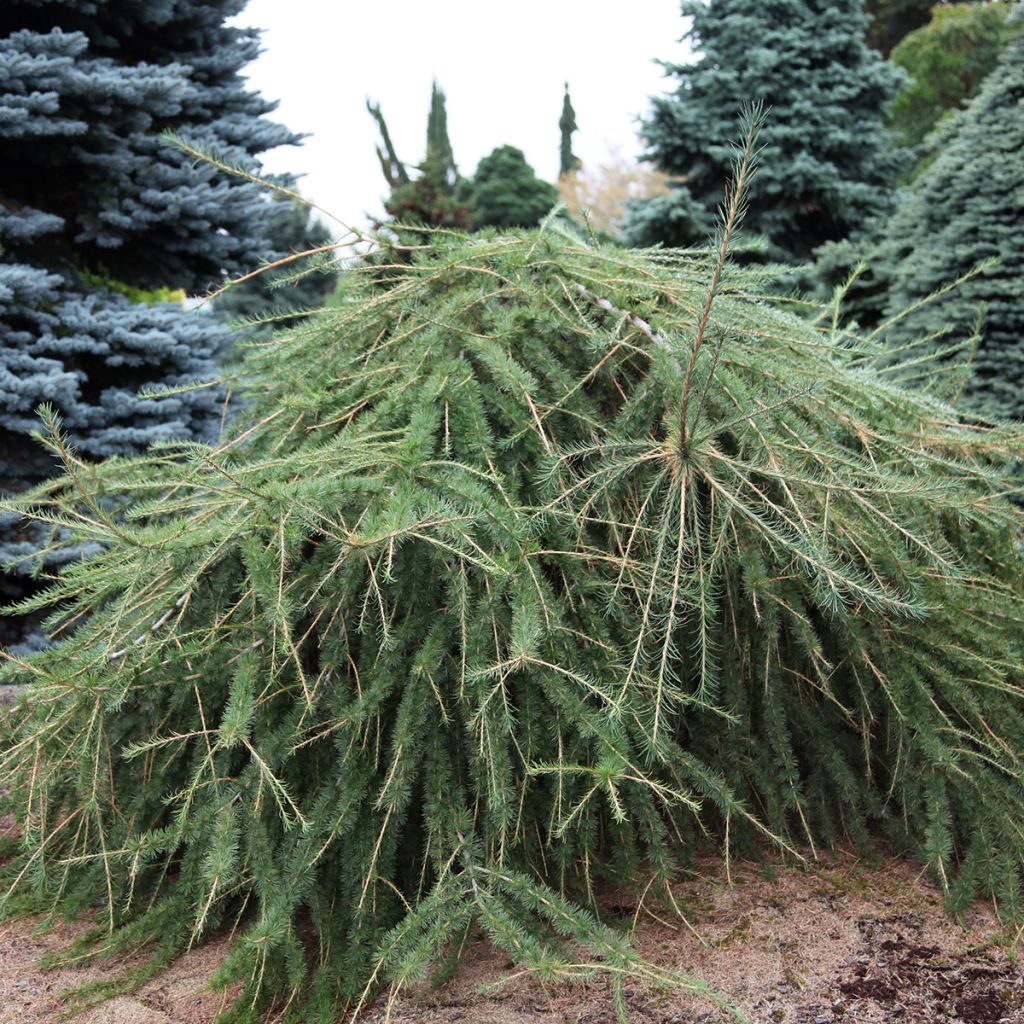

Larix decidua Varied Directions
Larix decidua Varied Directions
Larix decidua 'Varied Directions'
European Larch, Common Larch
Why not try an alternative variety in stock?
View all →This plant carries a 24 months recovery warranty
More information
We guarantee the quality of our plants for a full growing cycle, and will replace at our expense any plant that fails to recover under normal climatic and planting conditions.
Oversize package: home delivery by special carrier from €6.90 per order..
Express home delivery from €8.90.
Does this plant fit my garden?
Set up your Plantfit profile →
Description
Larix decidua 'Varied Directions', as its name suggests, is a European larch that develops branches in all directions. Its habit is generally weeping, with a prostrate crown grafted onto a classic larch trunk. It is a deciduous conifer with green needles that develop in spring and turn yellow in autumn before falling. It is a beautiful specimen with interesting architecture in winter. Native to mountainous regions, the European larch can withstand extreme cold. It thrives in light, slightly moist soil, without too much limestone, even poor, in full sun.
The European larch, Larix decidua, is a large tree that can reach a height of 30 m. This conifer belongs to the Pinaceae family, like Firs, Spruces, Cedars, and Pines. It is one of the few conifers, along with the Bald Cypress (Taxodium) and Dawn Redwood, whose deciduous foliage falls in autumn. It is native to the mountains of central and southern Europe, where it is found at altitudes between 1400 and 2400 m. It is a pioneer species capable of improving poor or degraded soils, with a high hardiness (down to -40°C). Highly valued for its wood, it adapts very well to lowland cultivation.
Larix decidua 'Varied Directions' is quite different from the original botanical species. This cultivar was selected by Dr. Sydney Waxman at the University of Connecticut. It is a variety with moderate development and slow growth. At the age of 20, the tree measures approximately 3 m in height with a spread of 3.50 m. Its crown is composed of robust branches that produce, or rather "propel," shoots upwards and outwards in various directions. The golden bronze branches eventually touch the ground, creating a unique configuration for each individual. This curious structure gives it a highly ornamental appearance in winter when the wood is bare. In spring, the shoots are adorned with tender, shiny green needle-like foliage, inserted in small tufts along the branches. The foliage darkens slightly throughout the growing season, then turns beautiful shades of yellow and bronze in autumn before falling. This extremely cold-resistant conifer is perfectly suited to mountainous regions.
Larix 'Varied Directions' will delight plant enthusiasts. Its original, yet romantically inclined habit, will not leave anyone indifferent. It should be prominently planted, as a stand-alone specimen, to allow it to express its full personality. This larch finds a place in a contemporary or Japanese-style garden. Its architectural silhouette, even in winter, truly catches the eye. It can be the focal point of a bed of ground cover perennials. Its habit will also be enhanced when overhanging, for example above a low wall. Plant it near an ornamental pond as well.
Report an error about the product description
Plant habit
Foliage
Botanical data
Larix
decidua
'Varied Directions'
Pinaceae
European Larch, Common Larch
Cultivar or hybrid
Other Larix - Larch
Planting and care
Larix decidua Varied Directions is a bush that thrives in mountain climates but is not suited for arid conditions. It should be planted in well-drained soil in spring or from September to November, preferably in a slightly acidic, non-calcareous location that receives full sun or partial shade. A mixture of coarse sand, ericaceous soil, and compost, added to the garden soil will work well, in a planting hole measuring 50 cm on each side and in depth. Soak the root ball in a bucket of water for fifteen minutes before planting, then water thoroughly once the hole is filled. If your soil is too clayey and sticky, a useful trick is to plant your bush on a mound and mulch it with non-calcareous gravel. Water regularly during the first two years, especially during prolonged dry spells. This hardy conifer also dislikes very clayey soils that become waterlogged in winter.
Planting period
Intended location
Care
This item has not been reviewed yet - be the first to leave a review about it.
Conifers
Haven't found what you were looking for?
Hardiness is the lowest winter temperature a plant can endure without suffering serious damage or even dying. However, hardiness is affected by location (a sheltered area, such as a patio), protection (winter cover) and soil type (hardiness is improved by well-drained soil).

Photo Sharing Terms & Conditions
In order to encourage gardeners to interact and share their experiences, Promesse de fleurs offers various media enabling content to be uploaded onto its Site - in particular via the ‘Photo sharing’ module.
The User agrees to refrain from:
- Posting any content that is illegal, prejudicial, insulting, racist, inciteful to hatred, revisionist, contrary to public decency, that infringes on privacy or on the privacy rights of third parties, in particular the publicity rights of persons and goods, intellectual property rights, or the right to privacy.
- Submitting content on behalf of a third party;
- Impersonate the identity of a third party and/or publish any personal information about a third party;
In general, the User undertakes to refrain from any unethical behaviour.
All Content (in particular text, comments, files, images, photos, videos, creative works, etc.), which may be subject to property or intellectual property rights, image or other private rights, shall remain the property of the User, subject to the limited rights granted by the terms of the licence granted by Promesse de fleurs as stated below. Users are at liberty to publish or not to publish such Content on the Site, notably via the ‘Photo Sharing’ facility, and accept that this Content shall be made public and freely accessible, notably on the Internet.
Users further acknowledge, undertake to have ,and guarantee that they hold all necessary rights and permissions to publish such material on the Site, in particular with regard to the legislation in force pertaining to any privacy, property, intellectual property, image, or contractual rights, or rights of any other nature. By publishing such Content on the Site, Users acknowledge accepting full liability as publishers of the Content within the meaning of the law, and grant Promesse de fleurs, free of charge, an inclusive, worldwide licence for the said Content for the entire duration of its publication, including all reproduction, representation, up/downloading, displaying, performing, transmission, and storage rights.
Users also grant permission for their name to be linked to the Content and accept that this link may not always be made available.
By engaging in posting material, Users consent to their Content becoming automatically accessible on the Internet, in particular on other sites and/or blogs and/or web pages of the Promesse de fleurs site, including in particular social pages and the Promesse de fleurs catalogue.
Users may secure the removal of entrusted content free of charge by issuing a simple request via our contact form.
The flowering period indicated on our website applies to countries and regions located in USDA zone 8 (France, the United Kingdom, Ireland, the Netherlands, etc.)
It will vary according to where you live:
- In zones 9 to 10 (Italy, Spain, Greece, etc.), flowering will occur about 2 to 4 weeks earlier.
- In zones 6 to 7 (Germany, Poland, Slovenia, and lower mountainous regions), flowering will be delayed by 2 to 3 weeks.
- In zone 5 (Central Europe, Scandinavia), blooming will be delayed by 3 to 5 weeks.
In temperate climates, pruning of spring-flowering shrubs (forsythia, spireas, etc.) should be done just after flowering.
Pruning of summer-flowering shrubs (Indian Lilac, Perovskia, etc.) can be done in winter or spring.
In cold regions as well as with frost-sensitive plants, avoid pruning too early when severe frosts may still occur.
The planting period indicated on our website applies to countries and regions located in USDA zone 8 (France, United Kingdom, Ireland, Netherlands).
It will vary according to where you live:
- In Mediterranean zones (Marseille, Madrid, Milan, etc.), autumn and winter are the best planting periods.
- In continental zones (Strasbourg, Munich, Vienna, etc.), delay planting by 2 to 3 weeks in spring and bring it forward by 2 to 4 weeks in autumn.
- In mountainous regions (the Alps, Pyrenees, Carpathians, etc.), it is best to plant in late spring (May-June) or late summer (August-September).
The harvesting period indicated on our website applies to countries and regions in USDA zone 8 (France, England, Ireland, the Netherlands).
In colder areas (Scandinavia, Poland, Austria...) fruit and vegetable harvests are likely to be delayed by 3-4 weeks.
In warmer areas (Italy, Spain, Greece, etc.), harvesting will probably take place earlier, depending on weather conditions.
The sowing periods indicated on our website apply to countries and regions within USDA Zone 8 (France, UK, Ireland, Netherlands).
In colder areas (Scandinavia, Poland, Austria...), delay any outdoor sowing by 3-4 weeks, or sow under glass.
In warmer climes (Italy, Spain, Greece, etc.), bring outdoor sowing forward by a few weeks.

































